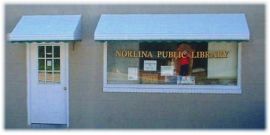 A railroad car once housed the little public library in the North Carolina town of Norlina (pop. 1,118).
A railroad car once housed the little public library in the North Carolina town of Norlina (pop. 1,118).
The library had been around more than 60 years. Librarians talked up good books, encouraged townspeople to get their high school equivalency diplomas, and made computers available.
On January 31, 2017, however, the Norlina library shut down.
Not enough people had checked out books in recent years, and the outdated computers hadn’t lured them, either. The kids preferred to use their own machines at home for school work and Facebooking.
 “I have sat up there, and not a soul comes,” Town Commissioner Bill Harris told the Warren Record. On top of that, the library’s roof leaked. Utility bills were the same whether or not crowds packed the library. Another library is several miles away, but that’s not the same as a community gathering spot within walking distance—especially as the library existed in its heyday.
“I have sat up there, and not a soul comes,” Town Commissioner Bill Harris told the Warren Record. On top of that, the library’s roof leaked. Utility bills were the same whether or not crowds packed the library. Another library is several miles away, but that’s not the same as a community gathering spot within walking distance—especially as the library existed in its heyday.
A national library endowment could have helped meet Norlina’s needs in several ways. First, it could have paid for national and maybe even local promotional spots in various media to encourage interest in libraries, books, and reading. Second, by way of national ebook collections, as well as possibly money for paper books, it could have expanded the reading choices in the library as well as at home. Third, it might have helped pay for more up-to-date computers and other gadgetry that young people might not have owned. Library users of all ages could have tried out ereaders and cell phone reading apps that librarians demystified for them. Fourth, the endowment might have paid for the library to be open at least a little longer than a few hours during the week and half a day Saturday. Maybe it could even have helped pay for repair of the leaky roof.
Yes, this is one little public library. But if the U.S. eventually becomes like the U.K., where hundreds of public libraries have closed, Norlina could be an early harbinger. Even large systems such as Miami-Dade’s have faced their share of challenges. In Washington, President Trump wants to defund the valuable Institute of Museum and Library Services.
Simply put, we need a national library endowment even if it would not be a full funding solution, and here is a list of reasons, beyond those given above:
- Libraries make good economic sense. For every $1 spent in a typical public library, the Return on Investment (ROI) is several dollars or more.
- The main killer of American jobs in the long term is not foreign competition. It’s automation. Libraries can help people master new skills and cultivate interest in key areas such as 3D printing and related technology.
- Countless school librarians have lost their library jobs despite numerous studies showing their usefulness. English teachers are no substitute when it comes to mastery of research skills. While students should learn these skills in every class, that is not the same as in-depth coaching from a true specialist. Simply put, well-trained school librarians are a highly cost-effective way to turbocharge education. As one school librarian puts it, she helps students “learn to learn.”
- Libraries now must teach traditional literacy and the digital kind. That means more resources so students and others know how to use digital technologies to the fullest. Many young people today cannot understand the technical manuals and other reading that the jobs of the future will require.
- Almost half the adults in Detroit were found to be functionally illiterate, and nationally, 14 percent can’t read. One-fifth of American adults cannot even absorb material at a fifth-grade level, and one-fifth of high school graduates are illiterate. Seventy-percent of prison inmates read at at a fourth-grade level or less. Illiteracy does not just increase crime, by reducing job opportunities. It also harms health—when patients cannot understand their doctor’s instructions, directions on bottles of medicine, or nutrition pamphlets.
- Americans need to be able to identify fake news online from domestic and foreign sources, including those trying to subvert the electoral process. In a Stanford University study, 93 percent of college students could not tell a lobbyist’s Web site from an unbiased one.
- Students and others also need to spot “sponsored content” now seen even on on reputable news sites. Four-fifths of middle-school students thought that a Slate magazine item described as “sponsored content” was a normal article.
- Books are less trustworthy in an era when anyone can publish electronically or on paper. What’s more, even major publishing houses can skimp on fact-checking—one more reason why we need librarians to help smarten up digital-era readers.
- A Harvard researcher finds that many young people are less committed than before to a democratic (small d) system. More than 70 percent of Americans born in the 1930s answered “10,” on a one to 10 scale, when asked if living in a democracy was essential. Fewer than 30 percent of those born in the 1980s did. Libraries should not propagandize, but they can educate Americans about their options and let them know what is historically “normal,” such as the press freedom supported by our First Amendment.
- Our children are not doing enough recreational reading, which can sharpen academic skills. 15-19-year-olds spend only about eight minutes a day reading for fun on weekends and holidays. By encouraging more reading, libraries help boost young people’s technical and creative skills and the academic skills they need to survive in the new economy. See a major study on recreational reading’s benefits.
- Amazon, B&N, and other large online bookstores are valuable, but they are no substitute for universal libraries. Bookstores are valuable in their own way but are not civic institutions with a commitment to the narrowing of the digital and educational divides.
- Demand for library ebooks is growing even if retail sales have fallen off or stabilized due to price increases from major publishers. In some cities, people must wait months for access to best sellers in digital format.
- Even so, reading in general faces a major threat from the plethora of multimedia choices ranging from elaborate video games to Netflix. Only about $100 of a typical household budget goes for recreational reading, compared to several thousand spent on other forms of entertainment, according to the Bureau of Labor Statistics.
- Ebook use could be higher if more Americans were more familiar with the technology and it were easier to use. From the eyestrain issue to navigational techniques, typical users don’t know how to enjoy ebooks. Part of digital literacy is ebook literacy.
- Most public library funding is local, but there are vast differences in resources available—hence, the need for a national digital approach with easier sharing of resources even though local libraries could still buy books on their own). The endowment could help libraries buy some paper books. But ebooks would be more cost-effective, especially with libraries able to bargain with publishers at the national level.
- Public and presidential library foundations total only several billion, according to a Wilmington Trust study—that’s a fraction of operating expenses. By contrast, the less than optimally managed endowment of Harvard University is now about $36 billion. Take money from Harvard and deploy it elsewhere? Not desirable or practical. But let’s focus more than on endowments for the nation as a whole and encourage billionaire donors to look beyond the needs of the elite. Alas, the Gates Foundation is actually winding down its valuable global libraries initiative.
- Public libraries can spend only about $4 per capita on collection items of all kinds, according to the Institute of Museum and Library Services.
- Libraries need money for the digital transition. A role will will remain for paper books, especially for children and for older people resisting change; but ebooks and other digital content will be the real future of reading. Paper books can’t be shared across vast geographical areas the way digital books can (with, yes, appropriate compensation for creators).
- The transition, in fact, is already happening. Libraries and schools are increasingly de-emphasizing paper books to make room for meeting rooms, study rooms and other uses, as shown by this example from the University of California at Berkeley, where 135,000 books have vanished from the top two floors. More than ever, we’ll need full-strength national digital libraries, including powerful databases for mass use, as well as innovative efforts to popularize reading (example here), especially if the books themselves are no longer in physical form.
- Private, charter and parochial schools—the very kinds pushed by many top-level policymakers and many in the business world—all need more library resources. The endowment will multiply the resources available to all students, not just those in public schools. Home-schooled students will also come out ahead.
- Collections at smaller colleges are far smaller than at larger institutions. They would especially benefit.
- While copyright terms are outrageously long, shortening them would not be much of a remedy. Just a fraction of public library users read public domain works. We are pro-public domain but believe that the national digital library cause has been set back by too much focus on this business model or lack of one.
- The library world needs more diversity—not just in terms of race and ethnicity but also in terms of the socioeconomic backgrounds of librarians. Many children will respond better to role models they can identify with. Via scholarships and in other ways, we could improve diversity.
Photo credit: Here.
One thought on “Why we need a national library endowment”